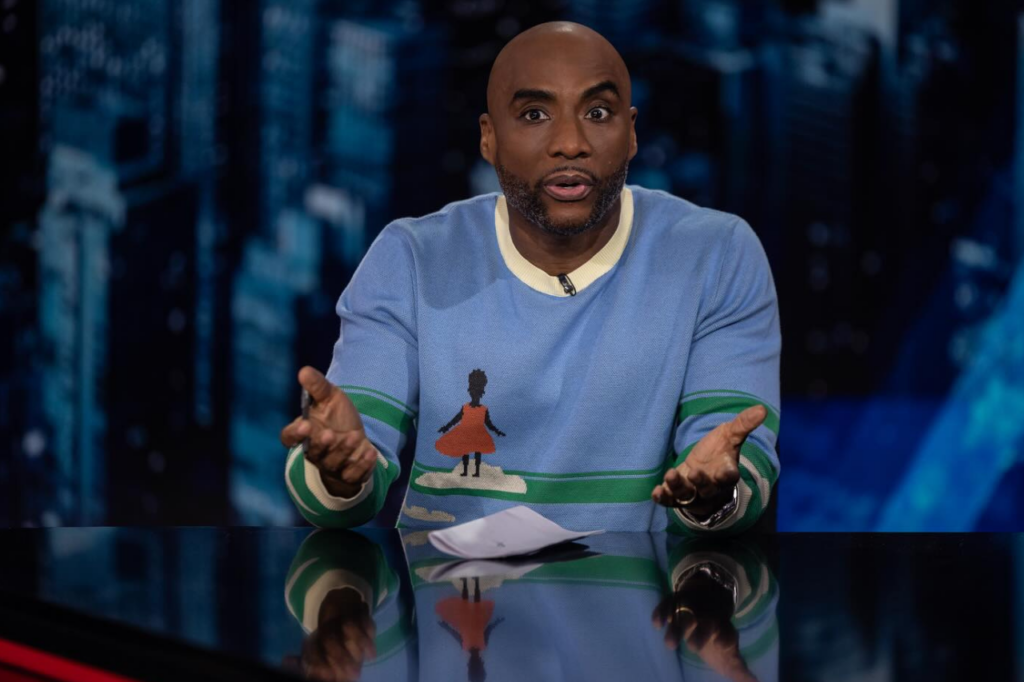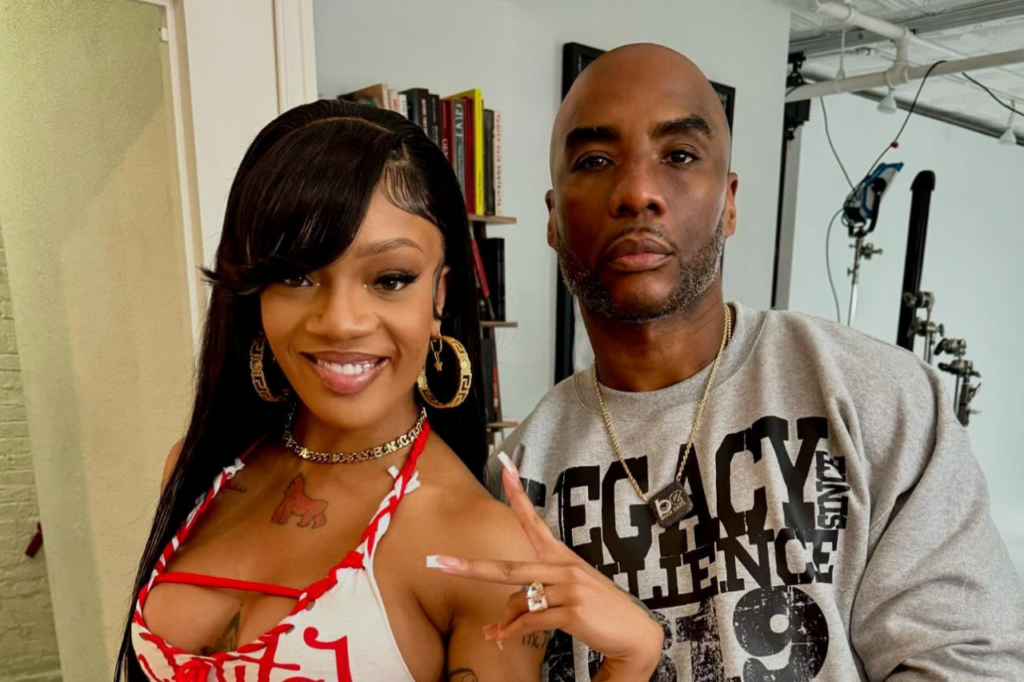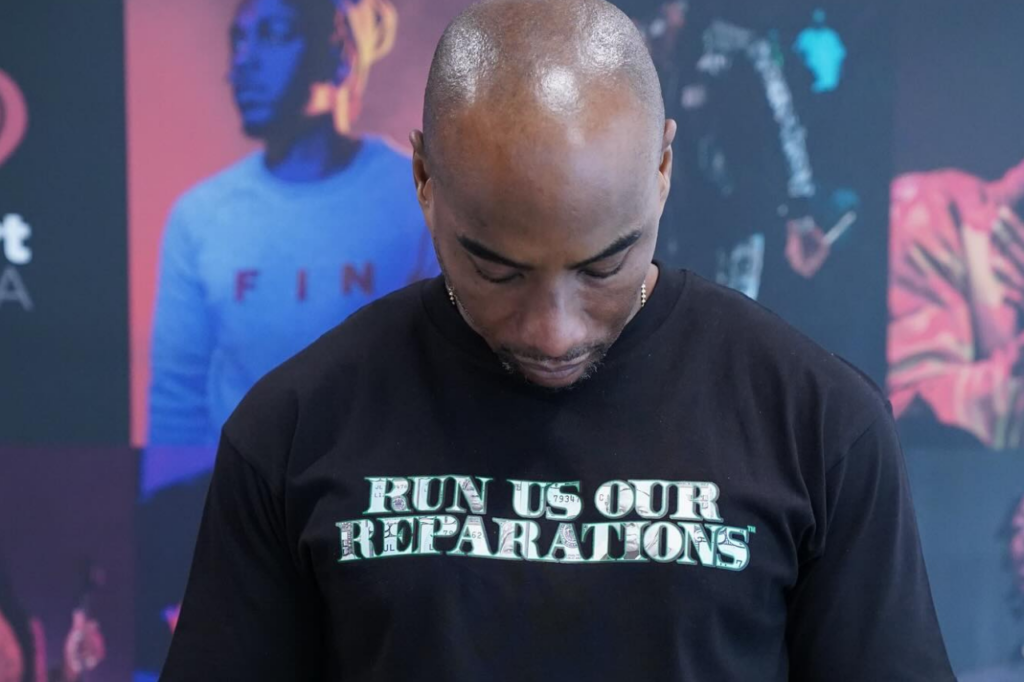In the carefully curated landscape of modern media, where personas are crafted with the precision of master artisans, Charlamagne Tha God presents an intriguing paradox. His journey from provocative radio personality to mental health advocate illuminates the complex dance between public identity and personal growth—a transformation that challenges our understanding of authenticity in the spotlight.
“I had no idea who I was,” Charlamagne reflects, describing the moment he realized the character he had created had begun to overshadow his authentic self. Like a method actor too deep in a role, he found himself navigating the blurred lines between his media persona and his true identity. This struggle resonates beyond the entertainment industry, speaking to anyone who has felt the weight of others’ expectations shape their public face.
The entertainment industry, with its intoxicating promise of success, often becomes what Charlamagne describes as “the greatest prison.” Success, rather than liberating, can become a gilded cage of expectations. “Just because something is successful doesn’t mean that it’s working,” he observes, challenging the conventional wisdom that equates professional achievement with personal fulfillment. This insight emerged from his own experience at The Breakfast Club, where despite reaching unprecedented heights of success in 2016, he found himself grappling with anxiety and depression, feeling increasingly disconnected from his authentic self.
The pressure to maintain a public image while pursuing personal growth creates a unique tension. Charlamagne shares how industry veterans like Wendy Williams warned him about the impossibility of being both “of the people” and “of the industry.” This dichotomy becomes particularly poignant when public figures attempt to evolve beyond the characters they’ve created. The audience, having grown comfortable with a particular version of their favorite personality, often resists change, creating what Charlamagne calls “a mind fuck”—watching the disconnect between public perception and private reality play out in real-time.
Yet, within this paradox lies an opportunity for transformation. Charlamagne’s decision to prioritize authenticity over character maintenance required tremendous courage. “I’m not going to be upset at you for placing a boundary for my peace of mind,” he states, demonstrating how setting boundaries—even at the risk of public criticism—becomes essential for preserving one’s authentic self. This approach has allowed him to navigate the entertainment industry while maintaining his integrity, showing that it’s possible to evolve publicly without becoming a prisoner of one’s past persona.
The path to authentic public existence requires a delicate balance: acknowledging the character that brought success while having the courage to outgrow it when necessary. Through therapy, self-reflection, and a commitment to honest dialogue, Charlamagne demonstrates that true authenticity in the public eye isn’t about maintaining a consistent character but about allowing oneself to evolve openly, even when that evolution challenges public expectations.
For those navigating their own public-private divide, whether in the entertainment industry or the everyday performance of professional life, Charlamagne’s journey offers a valuable lesson: authenticity isn’t about perfect consistency—it’s about the courage to grow publicly, to acknowledge change, and to prioritize personal truth over public perception.

In the ever-shifting landscape of media personalities, few transformations have been as profound or purposeful as that of Charlamagne Tha God. His metamorphosis from confrontational radio provocateur to mental health advocate represents not just a personal evolution, but a powerful commentary on authenticity in the digital age.
Like a character emerging from its own shadow, Charlamagne’s journey began with a realization that would resonate with anyone who has found themselves playing a role they’ve outgrown. “There was this character that had been created named Charlamagne,” he reflects, describing the moment he recognized the disconnect between his public persona and his authentic self. “I’m like, I don’t know who this person is.” This admission, striking in its vulnerability, marks the beginning of a transformation that would challenge conventional wisdom about success in the entertainment industry.
The catalyst for change arrived in 2016, at what might have appeared to be the pinnacle of his career. Despite the soaring success of The Breakfast Club, increasing wealth, and a New York Times bestseller, Charlamagne found himself grappling with an uncomfortable truth: external success didn’t guarantee internal peace. His decision to seek therapy during this period wasn’t just a personal choice—it was a revolutionary act in an industry that often mistakes bravado for strength.
Through therapy, Charlamagne began the delicate work of understanding the layers of his identity. The process revealed how childhood trauma had shaped his people-pleasing tendencies and influenced his provocative media persona. This insight led to a profound shift in his approach to broadcasting. Rather than pursuing shock value, he began focusing on creating spaces for meaningful dialogue, particularly around mental health in the Black community.
The evolution manifested in subtle but significant ways. His interviews transformed from confrontational exchanges into thoughtful conversations that probe deeper truths. As he describes it, “I’m always trying to see like what’s the bigger conversation that we can be having behind this.” This approach represents a marked departure from the entertainment industry’s tendency to prioritize viral moments over valuable discourse.
Perhaps most remarkably, Charlamagne’s transformation extended beyond his professional life. His commitment to authenticity led him to examine his role as a father, husband, and community leader. Through his own healing journey, he discovered the power of vulnerability as a tool for connection rather than a sign of weakness. “Nothing has been wasted,” he reflects on his path, “literally nothing there is absolutely nothing that has happened to me in my life whether you want to label it good bad… that has gone to waste.”
Today, Charlamagne stands as a testament to the possibility of evolution without abandonment of one’s core truth. His journey reminds us that growth isn’t about rejecting our past selves, but rather about integrating our experiences into a more complete whole. Through his books, podcasts, and public appearances, he continues to challenge the notion that public figures must remain static characters in their own stories.
This evolution from provocateur to advocate isn’t just a personal victory—it’s a blueprint for authentic transformation in the public eye. It demonstrates that true influence comes not from maintaining a carefully crafted persona, but from the courage to grow, change, and share that journey with others.

In the quiet corners of adult life, childhood trauma often lives like an invisible architect, silently shaping behaviors, relationships, and choices in ways we barely recognize. For Charlamagne Tha God, this reality emerged through the delicate unraveling of memories in therapy, where the threads of past pain began to reveal their intricate patterns in his present life.
At age eight, an experience of abuse became the foundation for what would later develop into a complex pattern of people-pleasing. “My therapist always told me like, I know exactly why I’m a people pleaser,” Charlamagne reveals, describing how the traumatic experience created a profound connection between rejection and self-worth. When his attempts to resist the abuse led to verbal degradation—being called ugly, being mocked for his appearance—a survival mechanism took root: accommodate others to avoid emotional pain.
This pattern, like many childhood adaptations, served its immediate purpose but extracted a heavy toll in adulthood. “You don’t realize how that carries on into adulthood,” Charlamagne reflects, “to where you just become this people pleaser you don’t want to let anybody down because if you feel like you let them down then they’re going to start speaking ill about you.” The echo of childhood trauma resonated through decades, influencing everything from professional relationships to personal boundaries.
The journey toward healing began with an unexpected catalyst—an episode of Oprah featuring Tyler Perry discussing his own experiences of abuse. Charlamagne’s initial reaction revealed the depth of his own unprocessed trauma: “I remember saying to myself like what’s wrong with him… and then at some point I remember saying to myself well what’s wrong with me?” This moment of recognition, though powerful, would take years to fully bloom into action.
It wasn’t until his mid-thirties that Charlamagne began the formal work of therapy, ostensibly to address anxiety and depression. Yet, as often happens in therapeutic work, these presenting issues were merely the visible peaks of deeper emotional icebergs. Through careful exploration, he began to understand how his early experiences had shaped his adult patterns of behavior, particularly his difficulty in setting and maintaining boundaries.
Perhaps most poignantly, Charlamagne’s healing journey led him to a profound realization about his father, who had also struggled with mental health issues. Learning that his father had been on multiple medications and attended therapy regularly decades ago transformed Charlamagne’s understanding of generational trauma. “Think about if he was able to just express himself and have those conversations with us as a family back then,” he reflects, “how that would have saved me so much grief when I was dealing with panic attacks and stuff as a child.”
This understanding fostered a remarkable capacity for grace—both toward his younger self and his father. “He’s just a man who was just trying to do his best with what he had,” Charlamagne observes, demonstrating how healing can transform not only our relationship with trauma but with those who, carrying their own wounds, may have contributed to ours.
Today, Charlamagne’s story serves as a powerful testament to the possibility of transforming pain into purpose. Through honest dialogue about mental health, particularly within the Black community, he helps others recognize and confront their own trauma patterns. His journey reminds us that healing isn’t just about breaking chains—it’s about understanding how they were forged, and using that knowledge to forge new paths forward.
In an era where digital interfaces mediate our most intimate connections, the art of genuine conversation has become both increasingly rare and profoundly valuable. For Charlamagne Tha God, the distinction between small talk and authentic dialogue isn’t merely semantic—it’s the difference between perpetuating social performances and fostering genuine human connection.
“We’re having too much Small Talk,” Charlamagne observes, “meeting we’re having too many micro conversations we’re taking these micros and making them macros.” This observation cuts to the heart of modern communication, where social media has transformed fleeting thoughts into viral moments, each competing for attention in an increasingly crowded digital sphere. The result is a paradoxical diminishment of meaningful dialogue in an age of unprecedented connectivity.
The ritualistic nature of small talk—the practiced “How are you?” followed by the automatic “Fine, thanks”—serves as a social lubricant, but also acts as a barrier to deeper understanding. Charlamagne challenges this convention with a refreshing directness: “I would rather just tell the person like we don’t have to do this.” This approach, while potentially jarring, speaks to a growing hunger for authenticity in our interactions.
The courage to initiate meaningful dialogue often requires breaking established social scripts. As Charlamagne suggests, it can be as simple as acknowledging the present moment: “You and this person are in this unique moment in time where y’all get to share space.” This perspective transforms potentially awkward encounters into opportunities for genuine connection.
Yet, the challenge extends beyond individual interactions. Social media platforms have created what Charlamagne describes as “background noise”—a constant stream of reactive discourse that prioritizes immediate response over thoughtful engagement. “Every day you get online and you know it looks like there’s a conversation that’s the biggest thing in the world,” he notes, “wait three hours wait four hours wait 12 hours it’ll be completely gone.”
To elevate conversations beyond this superficial cycle, Charlamagne advocates for a more intentional approach to dialogue. This means:
1. Acknowledging the moment’s potential for meaningful exchange
2. Being honest about your capacity for engagement
3. Looking for the larger themes behind seemingly small interactions
4. Creating space for authentic expression, even if it means sitting in silence
The impact of this approach extends beyond personal relationships into professional spheres. On his podcast and radio show, Charlamagne consistently pushes past surface-level discussion to explore deeper implications: “What’s the psychology or what’s the thing that we can discuss that people going to actually learn from?” This commitment to substance over spectacle demonstrates how authentic conversation can elevate public discourse.
Perhaps most importantly, authentic conversation requires the courage to be uncomfortable. It means moving beyond the safety of predetermined scripts and into the uncertainty of genuine exchange. As Charlamagne puts it, “You can’t like being uncomfortable because when we’re uncomfortable it it’s making us grow we know that we’re evolving.”
In a world increasingly mediated by digital interfaces and artificial intelligence, the ability to engage in authentic conversation becomes not just a social skill but a form of resistance against the dehumanizing aspects of modern communication. It’s a reminder that beneath our carefully curated online personas and practiced social scripts lies the potential for genuine human connection—if only we have the courage to reach for it.
The path to authentic conversation isn’t always smooth, but as Charlamagne’s evolution demonstrates, it’s essential for both personal growth and societal progress. By moving beyond small talk, we create space for the kind of dialogue that doesn’t just fill silence but enriches our understanding of ourselves and others.
In the glittering landscape of media success, where ratings and revenue often serve as the primary metrics of achievement, Charlamagne Tha God’s journey offers a compelling redefinition of what it means to truly succeed. His story illuminates the often-overlooked truth that external accomplishment and internal fulfillment don’t always travel the same path.
The year 2016 marked what appeared to be the pinnacle of Charlamagne’s career. The Breakfast Club was soaring, his first book “Black Privilege” had landed on the New York Times bestseller list, and his bank account reflected a level of success he’d never imagined possible. Yet beneath this veneer of achievement lurked a profound disconnection. “I’m having more success than I ever imagined,” he reflects, “I’m making more money than I ever imagined… but I’m not happy.”
This revelation challenges conventional wisdom about success, particularly in the entertainment industry, where external validation often masks internal struggle. Charlamagne’s decision to seek therapy during this period wasn’t just a personal choice—it was a radical act of self-preservation in an industry that often mistakes vulnerability for weakness.
His exploration of plant medicine, particularly ayahuasca, represents another departure from traditional paths to healing. The experience proved transformative, bringing forth a profound directive: “Stop lying to yourself and stop volunteering those lies to other people.” This insight crystallized the understanding that success without authenticity is merely a sophisticated form of performance.
The intersection of mental health and career achievement revealed itself in unexpected ways. Charlamagne describes the process of recognizing how his public persona, while professionally successful, had become a barrier to personal growth. “Success is probably the greatest prison,” he observes, noting how the fear of losing what we’ve achieved can prevent us from evolving into who we’re meant to become.
This realization led to a fundamental shift in his approach to both media and personal development. Rather than maintaining the character that brought him fame, Charlamagne began prioritizing authenticity over audience expectations. “I want to wake up more happy than depressed,” he explains, describing the motivation behind this transformation. “I want to enjoy life… I’m not the final form of myself.”
The role of plant medicine in this journey merits particular attention. Unlike traditional therapeutic approaches, these experiences provided what Charlamagne describes as a complete detachment from ego—a state where the carefully constructed walls between public persona and private self dissolved. This dissolution allowed for a more honest examination of success and its true meaning.

Perhaps most significantly, this redefinition of success has influenced how Charlamagne approaches his platform. Rather than chasing viral moments or controversial takes, he now seeks to create spaces for meaningful dialogue about mental health, particularly within communities where such discussions have historically been taboo.
The lesson embedded in Charlamagne’s evolution is clear: true success must include the freedom to grow, change, and occasionally disappoint expectations. It’s about creating a life where professional achievement and personal wellness aren’t competing forces but complementary aspects of a fully realized existence.
This redefinition suggests that perhaps the most meaningful measure of success isn’t what we achieve, but who we become in the process. As Charlamagne continues to evolve, his journey reminds us that the courage to prioritize mental health over maintaining appearances might be the most successful decision we can make.
In the delicate dance of modern parenting, where Instagram-perfect moments often obscure the messy reality of raising children, Charlamagne Tha God offers a refreshingly candid perspective on what it means to parent with authenticity. As a father of four daughters—ranging from age two to fifteen—his journey illustrates how vulnerability and honest dialogue can break generational patterns and create new paradigms of emotional expression.
The COVID-19 pandemic provided an unexpected window into this approach when his teenage daughter came to him in tears, overwhelmed by virtual learning and declining grades. Rather than responding with traditional parental authority, Charlamagne met the moment with empathy and perspective: “We are in an unprecedented time right now… you’re doing pottery class on the kitchen floor. Do you think I give a damn if your grades slip at a moment like this?” This response exemplifies a crucial shift from the performance-focused parenting of previous generations to one that prioritizes emotional wellbeing.
Perhaps most striking is Charlamagne’s willingness to acknowledge his own learning curve. “I’m 45 and I believe this little 15-year-old doesn’t know anything,” he reflects, “yet she knows a whole lot and she’s teaching me.” This humility represents a dramatic departure from traditional parenting hierarchies, where wisdom was assumed to flow in only one direction. By remaining open to learning from his children, Charlamagne demonstrates how modern parenting can become a mutual journey of growth and understanding.
The decision to introduce his daughter to therapy, not because something was “wrong” but because she was navigating unprecedented challenges, reveals a proactive approach to emotional health. “I want them to have the tools and the language early,” he explains, acknowledging his own ongoing journey with mental health. This strategy aims to equip the next generation with emotional resources that many of their parents had to discover later in life.
Creating safe spaces for emotional expression requires what Charlamagne describes as “checking my ego as a parent.” This means:
1. Acknowledging that children may have wisdom to share
2. Remaining present with their emotions without rushing to fix or judge
3. Recognizing that parenting styles must evolve with changing times
4. Understanding that vulnerability can be a source of strength, not weakness
The daily reality of parenting four girls brings constant opportunities to put these principles into practice. “Every day is a difficult conversation,” Charlamagne admits. “I’m dealing with a different set of emotions every single day.” Yet within these challenges lies the opportunity to model emotional intelligence and authentic communication.
Together with his wife of 26 years, Charlamagne approaches parenting as a collaborative journey rather than a predetermined path. Their “prayer circles and huddles” represent moments of mutual support and reflection, acknowledging that they’re “doing the best we can.” This honest admission—that there is no perfect manual for parenting—creates space for both growth and grace.
The lesson emerging from Charlamagne’s parenting philosophy is clear: breaking generational patterns requires more than just doing things differently—it demands the courage to be vulnerable, the wisdom to learn from our children, and the humility to acknowledge our own ongoing growth. In this way, parenting becomes not just about raising children, but about creating new possibilities for emotional expression and authentic connection across generations.
In the landscape of modern media, where authenticity often feels like a carefully curated performance, Charlamagne Tha God’s transformation offers a compelling blueprint for genuine evolution. His journey from provocative radio personality to mental health advocate isn’t merely a career pivot—it’s a testament to the transformative power of honest dialogue and emotional vulnerability.
“I’m not the final form of myself,” Charlamagne reflects, encapsulating a philosophy that challenges our cultural obsession with fixed identities and polished personas. This acknowledgment of continuous growth, coming from someone who built his career on unwavering certainty, represents a powerful shift in how we might approach both public life and personal development.
The ripple effects of his transformation extend far beyond individual impact. Through his work in media, literature, and mental health advocacy, Charlamagne has helped catalyze crucial conversations, particularly within communities where discussions of emotional wellness have historically been taboo. His willingness to share his own therapeutic journey, including experiences with plant medicine and traditional therapy, has helped destigmatize mental health support among demographics traditionally resistant to such interventions.
Perhaps most significantly, Charlamagne’s evolution demonstrates that authenticity isn’t about maintaining consistency—it’s about having the courage to grow publicly. By documenting his journey from provocateur to advocate, from character to authentic self, he provides a roadmap for others struggling to bridge the gap between public expectations and personal truth.
The lessons embedded in his story resonate across professional and personal spheres:
– True growth often requires letting go of successful but limiting patterns
– Authentic connection demands moving beyond small talk to meaningful dialogue
– Healing isn’t just about breaking chains—it’s about understanding how they were forged
– Success without personal fulfillment is merely a sophisticated form of performance
As we navigate an increasingly connected yet emotionally distant world, Charlamagne’s journey reminds us that genuine transformation requires more than surface-level change. It demands the courage to engage in honest dialogue, the wisdom to learn from our pain, and the vulnerability to share our evolution with others.
In this way, Charlamagne Tha God’s legacy may not be the provocative moments that launched his career, but rather the path he’s illuminated for others—a path toward authentic self-expression, emotional intelligence, and genuine human connection. His story suggests that our greatest contribution might not be who we are today, but who we’re willing to become tomorrow.


